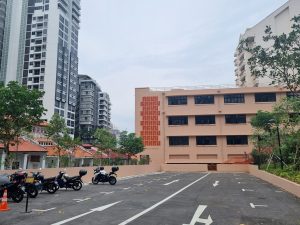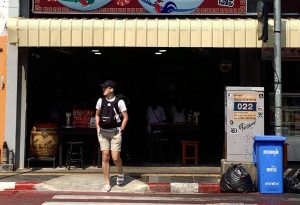Crazy Rich Asians has already been compared by reviewers criticizing it for its exaltation of late-stage capitalism to The Great Gatsby. It is a good comparison because it is true. We know enough by now that if you throw a Gatsby-themed Jazz Age wedding, the joke’s on you — you clearly have not read the book, or, having read it, did not understand it. The same applies to the misguided celebration of Crazy Rich Asians as some triumph of representation or diversity if it is to be praised for its satirical quality. If there is any satire of wealth made in the book, all of it is lost in the film version.
Every subplot in the film is wrapped up neatly with an offering made, finally, at the altar of wealth. When the cool, graceful, unflappable Astrid, whom we are meant to sympathize with, finally leaves her unfaithful husband, Michael, we are meant to relish the moment. Finally, Astrid, released (from what?), can take out her hidden Dior shoes, reach for those 1.2 million-dollar earrings, and strut off, off-screen mechanical fan blowing in her hair to reveal the glinting jewels (which required their own security on set).
We are asked finally, not merely to kneel at the shrine of Money, but to suck its cock. For money is plainly the phallus in the world of Crazy Rich Asians.
Michael Teo, played by Pierre Png, we are meant to understand, of course, gets to marry Astrid despite not being rich, because he is hot. (That this is exaggerated and deliberate is evident to the Singaporean viewer because, being a staple on the small screen in Singapore, while a good-looking guy, Pierre Png has never really played “hunk.”) This point is driven home because more than on any other character — more than even Nick Young — , the camera drools over his body. When we are first introduced to the character, we see his body before we see his face and the camera lingers hungrily on the drops of water that roll down his smooth back, the towel he brings over his washboard abs, wrapping it just above … his… The-Thing-We-Do-Not-See — which is, in other words, the thing he does not have. For in Crazy Rich Asians, wealth is the substitute for the phallus. And, hot as Michael is, he still, unfortunately, comes up short. Astrid lays this out for the audience when she says, at the end, that it is not her family’s money that destroyed their marriage — it is his cowardice; she “cannot make him a man because he never was one.” Well let’s be clear — he never was one because he never had the money-phallus.
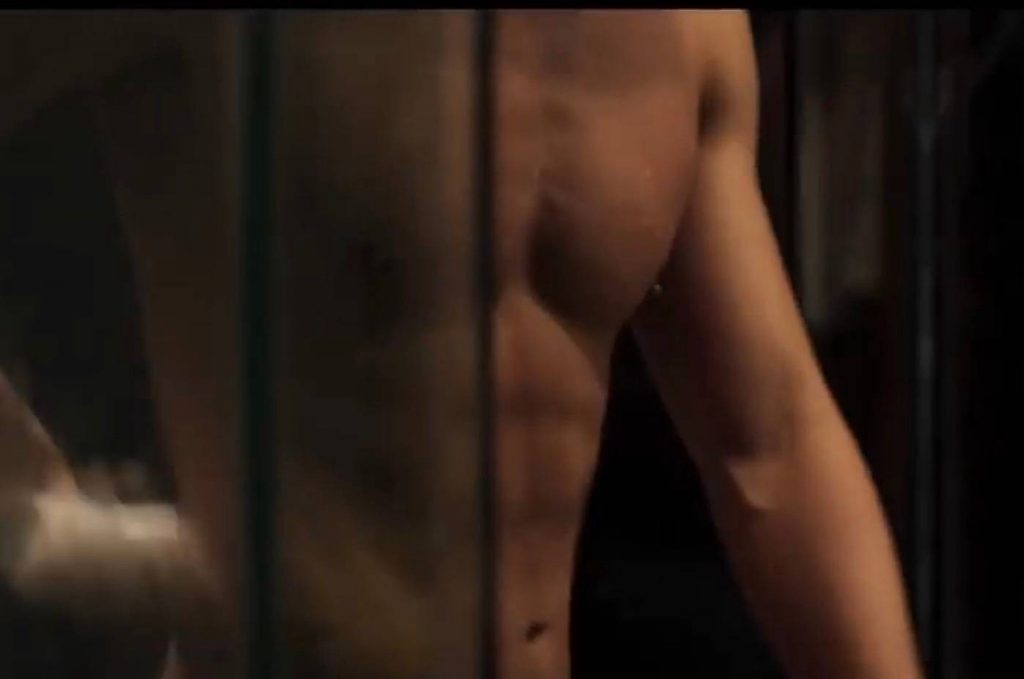
In the novel, Michael laments being “treated like just a piece of meat,” that “[they] were wrong for each other, but [they] both got so swept up in the moment — in, let’s face it, the sex — that” before he realized it, they were standing before a pastor. In the novel, Michael did not actually cheat, merely staging the affair in order to get out of a marriage he could no longer bear to live out. (Surprise surprise! — it emasculates him.) The film lets this not unimportant point slide, which, importantly, allows for wealth to triumph in the end. Pointedly, what is so goading about this is that it allows the triumph of wealth to be presented as a moral triumph.
But how ridiculous that we are made by the movie to feel on the side of Astrid, who, in addition to buying a pair of earrings for 1.2 millions dollars without batting an eyelid when we are first introduced to her, also boasts of having 14 other apartment blocks so she can deign to let Michael keep the one apartment he bought. How quickly we forget that in Singapore, where this is set, we have one of the highest rates of income inequality in the world and that property prices are some of the highest in the world. How happily we forgive that Singapore’s Gini coefficient is greater than America’s and that it is a country famous for its low taxes for the rich. (Can we stop talking already about how Eduardo Saverin gave up US citizenship to move to Singapore for this reason? Is this something we are proud of? Is it something we benefit from?) How readily we pretend the noose of mortgages and home loans and rents around our neck is not tight, that most are not shackled, ball and chain, to their real estate …. when given all this display of wealth to ogle at. How… self-defeating.
In an age of ever increasing inequality, of massive tax cuts for the 0.1%, of Jeff Bezos becoming 125 million dollars richer per day while Amazon employees sleep in cars and have timed toilet breaks, do we not know that the wealth accumulated by the super rich comes at the expense of others? The distribution of wealth in so many parts of the world today is a zero sum game.
But of course there is no space to critique the Young family in the film especially because in Crazy Rich Asians, they are presented as near national heroes, practically deity-like — not only as having gainfully earned their riches through industry, but even as having done something patriotic because they built their wealth by literally building Singapore, furthering a nationalistic and even moral defense for their wealth. Peik Lin Goh summarizes who the Youngs are for Rachel Chu: the Young family built Singapore up from a sleepy swamp of “pig farmers” to the glittering city that we see today. This is rhetoric that, to the Singaporean ear, too closely repeats the refrain the Singapore government has drilled into every Singaporean — that of Lee Kwan Yew and the PAP bringing Singapore from “Mudflats to Metropolis” in 50 years, our veritable Creators. Her storytelling, then, aligns the Young family, in rhetoric in any case, with Lee Kwan Yew. In other words, they are raised to the level of a God. Let’s not forget that Astrid, the “best” of them all, is nicknamed “The Goddess.”
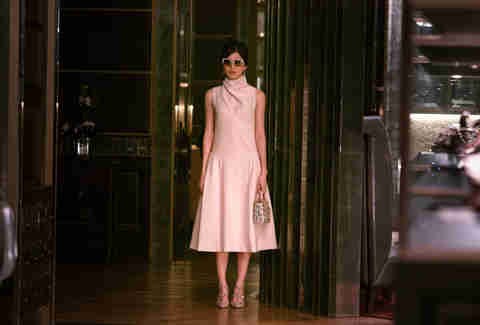
Crazy Rich Asians does mark an important moment in film history because it is the first time a big budget Hollywood film is helmed by an all-Asian cast and produced and directed by Asian people. Many of the articles coming out in the major publications arguing alternatingly for the film’s either progressive or regressive politics center around what it does for the Asian American community. But the “win” Asian-Americans claim the film garners for them is goading, particularly so in the context of the argument they are making about representation. The Asian American community is well-equipped with the tools and the vocabulary to critique appropriation — but in this particular case, they have let themselves off the hook. They are eager to use Singapore as a proxy for themselves when it suits them, when they are just as happy to elevate or otherwise differentiate themselves from “FOBs” (fresh-off-the-boat), Asian people who are not from the right class, in the right job, etc. This has played out infuriatingly in the NYT’s viral #thisis2016 hashtag a couple of years ago. Then, in a video, were retold a never-ending stream of grating anecdotes: “This guy mistook me for the guy cooking his Chinese food at the takeout counter. I’m a LAWYER”; “My uber driver told me my English was so good, he couldn’t hear an accent at all. Of course, I was BORN IN CALIFORNIA!” Again and again the same pattern emerged, one of substituting the shame of race — whatever the markers may be: accent, class, profession, food — with assertions of citizenship, of productivity, of wealth. In other words, assertions of qualities of not just the well-integrated and adjusted, but of the financially, socially, culturally successful. What do these anecdotes suggest about what we should think of Chinese takeout cooks? Or Asians immigrants (or even visitors) with an accent? What do they suggest about what we think of new immigrants? Of refugees? Of minorities for whom structures, present and past, have made the accumulation of wealth/immigration difficult?
They reinscribe the importance of citizenship, country of nativity, language, productivity, that form the basis for prejudice that these aggrieved persons faced in the first place. When the indignation stems from being confused with them (a Chinese takeout cook, a person with accented-English), it continues to traffic in an us/them binary, one that maintains the same irksome hierarchical structures that discriminate against Asian American people.
The Asian American community was quick (and right) to rush to condemn Oscars host Chris Rock for trotting out Asian children (dressed as the accountants who presumably flubbed the votes that resulted in such a goading skew to “white films”) to land a joke in bad taste at the expense of Asian Americans, even as he was making his case for better and more representation of African Americans during the 2016 Academy Awards amidst the scandal of #Oscarssowhite. Yet, in lauding Crazy Rich Asians for being a watershed moment for representation, Asian Americans conveniently do not see the lack of brown bodies on display, or the brown bodies only appearing in positions of servitude, or, most horrifically, dark bodies used for a breathtaking, cheap moment of racist comedy — Rachel Chu and Goh Peik Lin are shocked and scared by the appearance of turbaned Sikh guards at their car windows when they think they are lost in “the middle of a jungle” — faces emerging out of the dark as if they were predatory jungle animals. Can we not hear EM Forster’s famous phrase of Howard’s End ring out?: Only connect! To easily ignore these slippages and failures of the film constitutes a critical laziness and smacks of moral cowardice.
Asian Americans have taken to social media to hail Crazy Rich Asians as the Asian Black Panther. I can understand the need to feel like one’s identity has been reclaimed, the need to feel like one has been represented in roles that seem desirable or cool or something other than buck-toothed caricatures. I have lived as an Asian person in America for the last ten years; in many ways, the Asian American experience has increasingly become mine too. But not only is this Asian American response an appropriative one as I have explained above, it is profoundly insensitive and damaging. The importance of Black Panther is that, in the imaginary Wakanda, it presents the reparative and redemptive fantasy and potentiality of an Africa that has never been colonized. But it is still an imagined world, built on the fictitious material, Vibranium, that literally fell out of the sky. Singapore, in contrast, is a real place, with real people — it is, to me, home. What reviewers laud in Crazy Rich Asians in not an imaginary material, but neoliberal, late-stage capitalism on brash display — not to mention, a wealth that is enabled by Singapore’s colonial past, a past that has been traded in for colonial nostalgia. (There is no sense of postcolonial indignation in Singapore — there is no such critique taught in schools.)
But if the film doesn’t do for Asian Americans what they claim it is doing for them, it is also not doing anything for Asians in Asia. In one of the many tiring scenes where “Asian-ness” is being explained, Peik Lin tells Rachel that she is a “banana,” then goes on to explain what that is — that old, limp (forgive me) pseudo-joke about being yellow on the outside, but white on the inside. In an earlier scene, her mother (Tan Kheng Hua) tells her this too. But when Rachel Chu “wins,” in the end, she wins because of her “insides” — in other words, her whiteness and her Americanness. What the show expounds, in the end, is that it is a great time to be a banana. Rachel Chu is a banana and the triumph at the end of the film is the triumph of (white) American exceptionalism and individualism over the “Crazy” Rich Asians. And let’s be clear — the title is meant to be derogatory. It’s not just “crazy rich” Asians, but also “crazy” rich Asians. Kwan’s second novel, “China Rich Girlfriend” confirms this, for in that title, “china” is the modifier.
The film is praised for its representation of complex characters, for finallyshowing that yellow people have complexity. But what complexity are we given to see? Most of the characters are mostly vain, petty, greedy, materialistic, bitchy, conniving. Here and there, badly behaving Asians are used as a convenient excuse for “complex characters” which parades as a subversion of the stereotype of smart, meek, well-behaved, hardworking Asian. Is this the best that can be done to throw off the yoke of the Model Minority Myth? Are we so starved for representation that bad behavior not only passes for complexity, but is also championed for diversity in representation?
Let’s go to one of the more upsetting scenes of bad behavior by way of returning to the money-phallus. The bachelor party scene ends with the uncaptioned chant “ku ku jiao,” started by Bernard (Jimmy O. Yang), that mirrors that amazing scene in Boots Riley’s recent wild romp, Sorry To Bother You where Cassius (Cash) Green (Lakeith Stanfield) is made to perform his race for the pleasure and consumption of a white audience, and ends up yelling “Nig** shit, nig** shit, nig** nig** nig** shit” to their delight. “Ku ku jiao” is a term few outside of Singapore would understand, meaning “little birdie” or a little boy’s dick (a different term, “lan jiao,” would translate more like the locker-room jargon, “cock,” but that term is not used) — a thoroughly desexualized term and a painfully pathetic, self-hating dig at Asian male sexuality masquerading as narcissism and machismo.

The delight the rich white yuppies in Sorry To Bother You derive lies in having Cassius yell a literalization of what, to them, he is. For Bernard and the rest of the merrymakers at the bachelor party, this is true too. The next thrust of my point lies in the fact that while he is yelling this, Bernard is carrying a giant cannon held at his crotch, a comedic substitute, after all, for the tumescence he does not have. Out of this he pumps –-not fireworks (which the budget of the film must have allowed and the aesthetic of the film must have found appropriate) — but impotent crackling duds that shoot forth and plop lamely into the sea, fizzling out. Before the camera cuts to the next scene, at the height of the “ku ku jiao” chant, he shoots out one last firecracker aimed at a skimpily clad dancer on the edge of the pool and blasts her off stage. Is this comedy? Is the best performance of Asian male sexuality and virility one that must culminate in an act of violence against a woman? Is this how the Asian man wins?
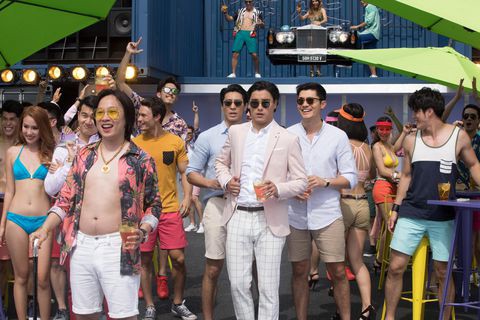
Had he the “ku ku jiao” he wanted to show off, when caught by the paparazzi with the gold digging Kitty Pong (Fiona Xie) in a later scene, he would not be turning embarrassedly away, tail between his legs, as it were (yes, pun intended). The embarrassment here, therefore, is not that he has been caught having sex (Bernard would love that), but that he has been caught with a small and/or limp dick — the joke, of course, rooted in the stereotype of the emasculated Asian male. To this situation, he turns to hide his dick, and to the eye of the camera and the audience both, instead offers up his naked ass — a brief moment of nudity that is meant to serve as comic relief.
But it is not really a funny moment. For starters, it occurs at a sort of manic and deranged moment in the film — when Rachel has been told the “truth” about her mother and is running confusedly away, getting lost among and accosted by, (for the first time what really feels like) Crazy Asians. Bernard’s literal undressing then occurs alongside Rachel’s metaphorical denuding and both are quite horrific. Recall, too, for a moment, that when punched by Nick Young as a boy, Bernard “wins” not by returning the punch, but by sitting on him. *Insert old locker room joke about checking before sitting down in a steam room lest you sit in another man’s lap.* What passes for comedy is then profoundly homophobic, for it lies in the potential for the (Asian male) body for penetration. As Leo Bersani enlightens us in “Is the Rectum a Grave?” the penetration of bodies (male and female alike) is used too often in cultural representation to suggest a posture of being demeaned or humiliated and its use here therefore is loaded.
Of course, none of these cerebral critiques of the film I have offered yet quite get at the heart of the much more visceral reaction I had. I found myself weeping throughout the film, leaking tears inexplicably. It wasn’t because I was so moved by Rachel Chu’s trials and tribulations and ultimate triumph (which was what? So much homage, after all, to the tired old marriage plot) for Constance Wu’s googly eyes irritated me — her moments of cutesy-ness and self-infantilizing and fawning feeling like some subconscious capitulation to the trope of what a lovable Asian girl is. (Does anyone know of an Economics professor who behaves like this?) No, I felt crazed. My impulses upon seeing my little country on screen were to rush forward and either cover up the screen, like seeing a sister or a good friend stripped on stage, or to tear it all down. Again and again, not Gatsby, but that harrowing scene from Darren Aronofsky’s horror extravaganza Mother! flashed in my mind — of the Woman (Jennifer Lawrence) rushing pleadingly after her baby while the Man (or God played by Javier Bardem) tells her that the adoring fans out there just want to see him, just want to love him, just want to worship him. My fellow Singaporeans and my country itself seem to say this too — this is a chance for Singapore to be showcased on the world stage, a #win for #representation, an “INCREDIBLE BRANDING OPPORTUNITY!” to echo a local politician on the Trump/Kim summit. It doesn’t in fact matter that, in a Bacchic frenzy, in their greed or their love (it doesn’t matter which) they tear and grab at the baby, ripping it apart and eating it up. Again and again as Singapore was put on display, I felt like the Woman, whimpering “he’s mine.. he’s mine..,” anxious for the awful house guests masquerading as worshipping fans not to take her baby.
For Singapore is not yours — she is not even mine.
What saddens me is how ready Singapore is to prostitute herself for attention. What infuriates me is how ready the world is to use Singapore to serve as confirmation for their own ends. Singapore is quite stunning — indeed she has a brilliant shining facade which works as the most perfect magic mirror. Ask Singapore anything and she will show you the best answer: What does a suppression of free speech look like? What does a country with no free and independent media look like? What does a country with high income inequality look like? Oh, oh oh. A prism light show; a cantilevered ship on the top of 3 buildings; skyscrapers; a harbor so busy it looks like its own city at night — Singapore twirling and answering: “me, me, me.”
If the film is a celebration of capitalism call it so, but it is not a celebration of diversity. The galling part of the hype around the film and representation is that it allows one to be taken for the other. For example, Goh Peik Lin’s character need not, for the purposes of plot, have been rich. Her character would have provided a prime opportunity to showcase someone of a different socio-economic class, to highlight Singapore’s wonderful public housing, if, indeed, diverse representation was what we were going for. I know by now it is not.
To praise the show for being “a watershed moment for representation” or the “first of its kind” is to facetiously traffic in false opposites, to be like Foucault’s Victorians who everywhere whisper in hush tones that no one talks about sex. To say that this is the first time Asians have been allowed to be seen in a positive light is to trade on a presupposition that we have not — and that is a lie. To be sure, Hollywood hasn’t always been a great source for representation — but do we expect it to be? The people who claim Asians have never been so beautiful on the big screen have clearly never watched a Wong Kar Wai film. In the 80s, Japanese pop culture gained popularity in America and the rest of Asia following its economic boom. In the past decade, the growth of the Korean beauty industry and the Kpop music scene has led to vast changes in the perception of beauty around the world. There are more (east) Asian models on the catwalks and fronting campaigns for luxury goods than ever before. If that is the sort of representation we are seeking, it hasn’t not been there. I’m not trying to say more shouldn’t be done, I am asking for people to be clear-eyed. As for representations of Singapore, two Singaporean film directors have garnered critical attention internationally and regionally at the Cannes Film Festival and the Golden Horse Awards for their works which specifically showcase Singaporean stories — Anthony Chen’s Ilo Ilo and Boo Junfeng’s Apprentice.
And this is what that bewildering opening quote from Napoleon about sleeping giants reveals: “China is a sleeping giant. Let her sleep for when she wakes she will shake the world.” Singapore is not and has never been part of China. Asian people are more interesting now quite simply because China is powerful and has money. What’s that pithy racist aphorism again? All Asian people look alike. The present moment is a time when being a minority can be worn like a trendy skin in certain contexts (this doesn’t mean that minorities are not then discriminated against because the two are not mutually exclusive) and that is happily adopted and used to obfuscate that what we are really celebrating in Crazy Rich Asians is money. If it is a good time to be a banana — yellow on the outside — it is a better time to be gold.
Crazy Rich Asians may have its use for various groups, may enable different things, but let the international community not forget that Singapore is a real place, and it is not there for the use-value other groups can foist upon it. To a country of 5 million people, most of them not Crazy Rich, it is home.
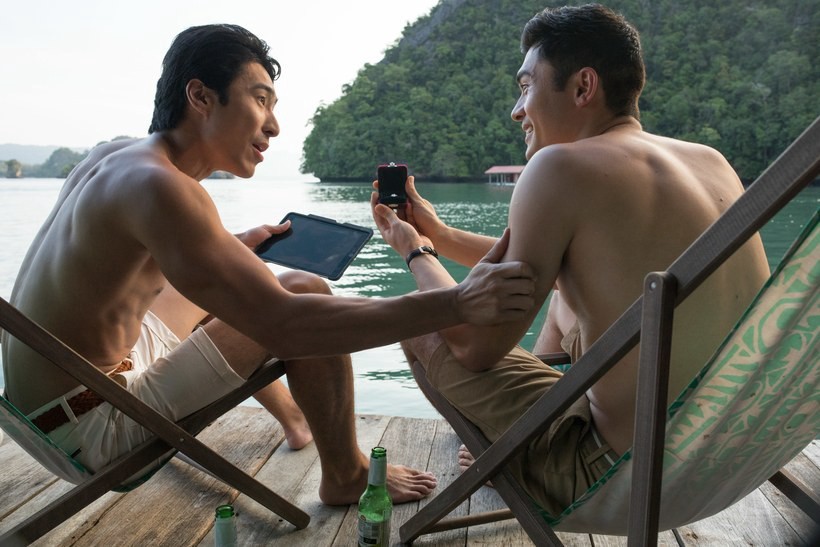
The film is not without its redeeming qualities. In fact, its best scene comes right after its worst. To my surprise, one of the movie’s bravest and sexiest scenes is one rife with homoeroticism. After the painful bachelor party scene, the camera cuts to Rawa Island, where Colin and Nick lounge lazily, drinking beer. The scene opens with Colin jesting, “Listen, if it weren’t for Araminta, I’d ask you to marry me!” So much romance after all passing for bromance. Rawa Island is known in the region as a getaway vacation spot for couples. (Listen, I went there a year ago with my husband after we had just gotten engaged and we did the only two things available to do there: we had beers like Colin and Nick, and the other I leave to my discerning reader to fill in the blanks.) The two men sit half naked, perfectly at ease with each other, speaking candidly about their relationships, expressing happiness and due concern for each other, opening up and displaying vulnerability — this might yet be the most healthy portrayal of male interaction (Asian and otherwise) that I’ve seen in a rom-com in decades! — and are, for the first time in the film, actually sexy. Their easy banter and open honesty with each other feels somehow sexier than the prescriptive interaction between the main couple. Sex between the main heterosexual couple is connoted twice in the film but both scenes are clunky and awkward — the first suggests, perhaps, the raunchy fantasy of joining the “Mile High Club,” but honestly, when have collared, long-sleeved silk pyjamas suggested anything other than the uniform of philanthropic old rich men in movies, much less sex appeal?
The film has already done much in generating buzz about race and representation, and has already done wonders for the careers of the Asian actors that have been involved in the film (Henry Golding will star in two more Hollywood films before the year is over, Gemma Chan has now been signed on to the Marvel Universe) and may yet do more — I hope it does. But that conversation should be separate from what the film itself is.


